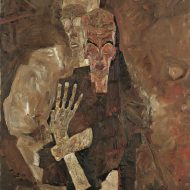 Black metal has its innovators and then it has individuals like Jute Gyte’s Adam Kalmbach and Ayloss from Spectral Lore. Kalmbach is nothing short of prolific with 27 full-length albums since 2006, perhaps not that unusual in the black metal community, but rather than album after album of windswept noise and mournful cries he prefers splicing noise and electronics with experimental black metal and drawing in references to Greek mythology, philosophy, art and poetry – as here. In fact, it’s usually not necessary to do too much background reading when tackling your new metal release but here it’s almost essential. Spectral Lore’s Ayloss shares a lot of similarities with his interest in art and philosophy – and perhaps more specifically too, often as important, the artists behind the work. So, here the pair take on the work of Austrian expressionist poet Georg Trakl. Trakl in the early 20th century was to poetry what Edvard Munch (of ‘The Scream’ fame) was to art and Kafka to literature. Moving away from positivism and modernism, the expressionists found themselves drawn towards the individual’s view of the world – loss of control, angst and the individual’s very emotional response to the world around them.
Black metal has its innovators and then it has individuals like Jute Gyte’s Adam Kalmbach and Ayloss from Spectral Lore. Kalmbach is nothing short of prolific with 27 full-length albums since 2006, perhaps not that unusual in the black metal community, but rather than album after album of windswept noise and mournful cries he prefers splicing noise and electronics with experimental black metal and drawing in references to Greek mythology, philosophy, art and poetry – as here. In fact, it’s usually not necessary to do too much background reading when tackling your new metal release but here it’s almost essential. Spectral Lore’s Ayloss shares a lot of similarities with his interest in art and philosophy – and perhaps more specifically too, often as important, the artists behind the work. So, here the pair take on the work of Austrian expressionist poet Georg Trakl. Trakl in the early 20th century was to poetry what Edvard Munch (of ‘The Scream’ fame) was to art and Kafka to literature. Moving away from positivism and modernism, the expressionists found themselves drawn towards the individual’s view of the world – loss of control, angst and the individual’s very emotional response to the world around them.
Now I’ve most likely just botched the entire explanation of the above definitions and will no doubt have students of what I’ve crammed into the above explanation writing to us in their droves. But it’s worth reading just a little about Trakl – who described Helian, the poem on which these two tracks are based, as ‘the most precious and painful I have ever written’. It’s set around a series of almost classical but fragmented images hinting at the struggles of the individual against the backdrop of civilisation’s decline. At first glance it’s slightly impenetrable but it opens up with repeated dives – as with this accompanying music. Jute Gyte’s grinding, atonal composition tries to grapple with the emotions as if each time it tries to seize on the substance of itself, it falls away through the constantly swirling melody. Sorrowful and heartfelt, the 20 minute excursion makes its way through to an up swell of multi-layed intensity that rises up through the centre of the track as if trying to escape the chaos and then flows into an insistent, harsh, finale that eventually resigns itself to an ebbing, hypnotic pace.
Spectral Lore, an artist I’m more familiar with than Jute Gyte, and anyone that has indulged in the likes of Sentinel, III or Gnosis will know exactly what Ayloss is capable of achieving in a short space of time. His side of the split begins with a disconsolate swing of precisely picked pastoral chords backed by a doom-filled riff. The set-up feels precarious and vulnerable to the shattering intensity that often intervenes in the most serene moments of any Spectral Lore outing but, after several minutes teetering on the edge, things drift into virtual silence. The second part of the track then thunders into a trudging riff before finally giving way to a torrent of musical emotion that could well be the musical equivalent of Munch’s most famous work. The final few minutes sees Ayloss let the emotion unwind into blissful but grinding tremolos and sorrowful, crooning vocals that almost leaves you lightheaded after the turbulence that had gone before.
While Jute Gyte is methodical and clinical in his musical analysis of the poem, Spectral Lore’s emotional flight is almost too much to bear. One being like an experimental and intensely obsessional Drudkh, the other, well, it’s Spectral Lore. What more can I say. I won’t deny there may be hard work ahead. But this is impressive stuff that shifts borders and may even leave you breathless. Because these are artists that shouldn’t disappoint anyone who has the time and inclination to sit down, open up and absorb it as you might with Franz Kafka or William Blake.
(8.5/10 Reverend Darkstanley)

Leave a Reply